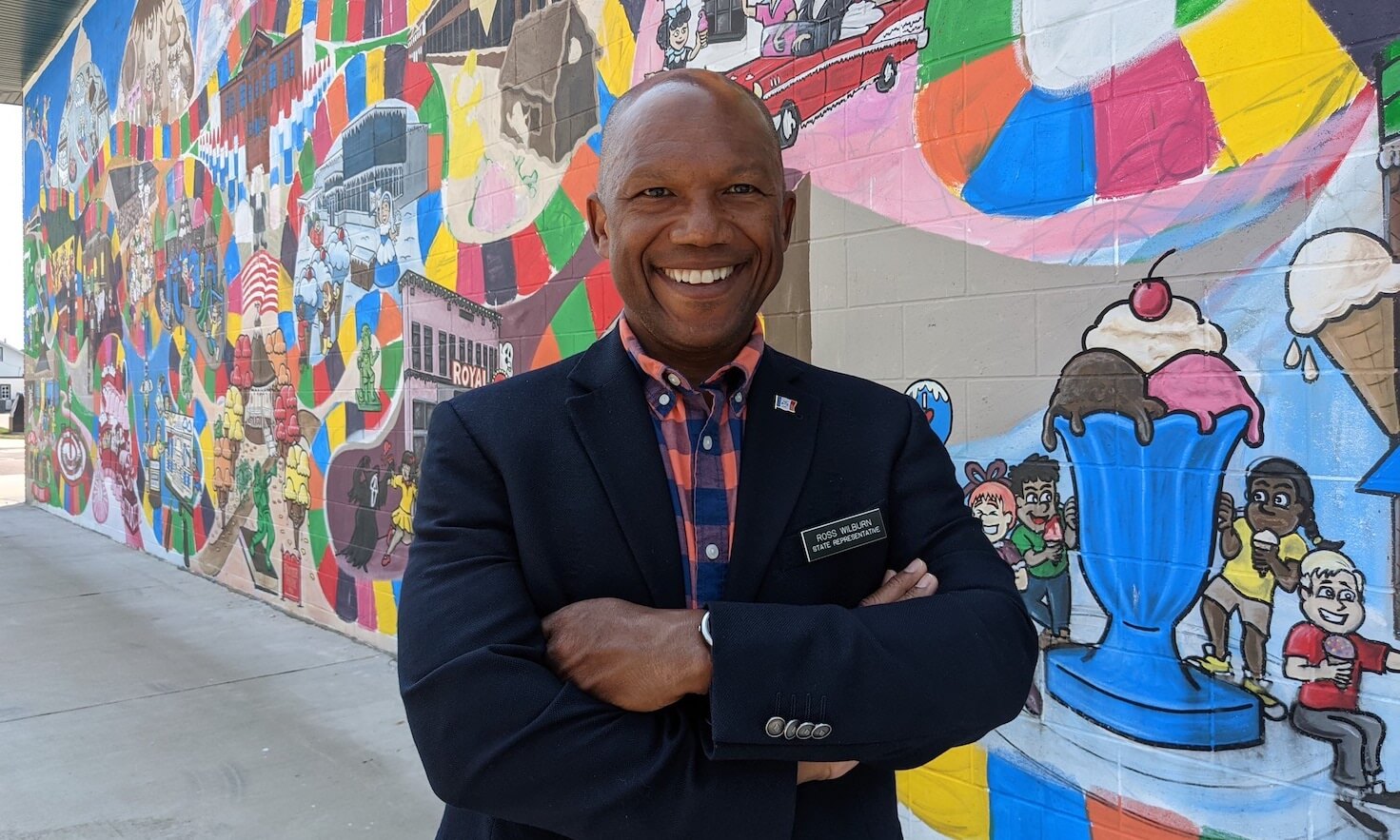
Outgoing Iowa Democratic Party Chair Ross Wilburn in Le Mars.
A few days after publicly announcing he won’t seek a second term as chairman of the Iowa Democratic Party, Ross Wilburn is at peace with the decision, although with a few caveats.
First of all, contrary to how some outlets reported, he is not stepping down from the position and will complete his two-year term in January. Wilburn said if it were a four-year term, he would still be serving as chair and would be at the same crossroads at the end of it.
“I’m a legislator—I didn’t make a rash decision—I weighed all the factors, here’s a decision,” Wilburn told Starting Line. “But when stories come out like that with not quite painting an accurate position, now it puts that type of doubt and narrative out there.”
Wilburn made history as the first Black man to be elected chair for either of Iowa’s two major political parties and that means something to him. So it stung when he received an email from a young Black woman who read a story that said Wilburn was “stepping down” and she told him he was sending a negative message to Black people by giving up.
“Now I’ve got to put time, energy, and effort into letting folks in disenfranchised groups [know] it’s important to be involved,” Wilburn said. “If you have something to contribute, contribute as long as you can and where you can.”
[inline-ad id=”3″]
Secondly, Wilburn said the results of the November general election in which Iowa Democrats were thoroughly trounced by Iowa Republicans was not the deciding factor in his decision nor was the Democratic National Committee’s Rules and Bylaws Committee’s decision to remove Iowa from the top of the calendar in the presidential selection process.
Wilburn does wonder if a stronger showing by Iowa Democrats would have persuaded the rules and bylaws committee to at least grant Iowa a waiver to remain in the first five of the presidential nominating process.
“That also would have helped fight the narrative that Iowa’s done,” Wilburn said. “That’s going to have a negative impact on some national fundraising and dollars from DC.”
So, let’s say Iowa Democrats performed better and Iowa would remain a factor in picking potential Democratic presidents—Republicans remain committed to keeping Iowa first in 2024—would Wilburn have been tempted to run for another term?
“No, it wouldn’t have changed my decision,” he said.
[inline-ad id=”0″]
The Lows
The 58-year-old said he came to the decision after talking it over with family and friends and that he never makes any professional decision lightly.
“Whether it’s running for public office or leading a political organization, it’s not just about you; it affects the people around you, your family, your friends,” Wilburn said.
Since being elected chair in January 2021, Wilburn has burned the wick at both ends trying to help reinvigorate the Iowa Democratic Party following the infamous 2020 caucus and less-than-stellar showing in that year’s general election while also serving as a state legislator representing part of Ames.
Besides the workload, Wilburn said his family had concerns about the amount of exposure that came with both of those roles.
“It’s not just my physical safety, but the time I don’t get to spend with my partner and my children, even though they are adults and living on their own,” he said. “And they also get contacted by people in the public around them that know and see media coverage coming out of Iowa or anywhere else that involves me.”
[inline-ad id=”1″]
In October 2021, Wilburn received racist threats via email and voicemail after he penned a Des Moines Register op-ed criticizing former President Donald Trump who was hosting a rally in Iowa when the article was published.
The situation was looked into by multiple law enforcement agencies but, ultimately, no charges were filed because the woman who left the voicemails didn’t directly threaten to lynch Wilburn but suggested that someone should.
“Unfortunately, that’s the society we live in, and people who are from an underrepresented group, it’s something else we have to deal with that others don’t,” Wilburn said, “So, you know, that clearly was a low point but the support that came from Iowans—not just Democrats—but the support that came from Iowans saying ‘they’re sorry that happened,’ ‘that shouldn’t happen,’ and ‘they’re angry that that happened.’
“…It’s one of those negatives that results in some positive action.”
[inline-ad id=”2″]
The Highs
Still, Wilburn said his time as chair had more highs than lows. He was proud to “be the voice of Iowa” amongst all his fellow Democratic Party state chairs across the country and serving as Midwestern regional vice president of the Association of State Democratic Committees
Wilburn also considers encouraging the return of door-knocking for candidates among his highs. Democratic candidates avoided door-to-door campaigning in 2020 due to the pandemic, but COVID vaccines were rolling out when Wilburn was elected chair so he felt comfortable with bringing that back.
“People were concerned that Democrats not being able to go door-to-door canvassing may have cost us some seats in the legislature with that last election,” he said referring to the 2020 general election. “So I made the statements that we are going to do more door work. We know how to protect ourselves better, we’ve got vaccines, we’ve got masks, those types of things.”
Another high is the return of in-person events including the Liberty & Justice Celebration fundraiser, which had last been held in 2019. The event draws thousands of people and, in the recent past, a number of presidential hopefuls.
“There’s so many it’s hard to choose, but those are some of the high points,” Wilburn said.
[inline-ad id=”3″]
Back to Basics
Two of the biggest hurdles Wilburn’s future successor will have to deal with are fundraising and what to do about the caucus. The loss of first-in-the-nation status hurts the party nationally when it comes to raising money and the Rules and Bylaws Committee’s decision also conflicts with Iowa’s law which says the caucus should occur eight days before any other presidential selection process.
Wilburn has advice for both stances. One is doing more with less and building on Iowa’s strong history with grassroots campaigning.
“We will have to,” he said. “And this past campaign, I asked people ‘what’s that one more thing you can do, one more door to knock on, one more phone call, or is it one more dollar that you can give that has to be part of the equation too.”
He also says Iowa Democrats have to push back against the narrative that Iowa is no longer competitive.
“Iowa has congressional seats too. Iowa has senate seats too. As Democrats nationally, we shouldn’t just be relying on protecting a slim margin,” Wilburn said. “If we put people over politics and connect those dots for folks and invest in areas where Democrats haven’t performed as strong as they used to or strong at all, then we can move that needle to build the numbers in Washington, DC.”
[inline-ad id=”4″]
The Caucus
As for the caucus itself, Wilburn said his successor has to remember Iowa has a state law and that the event is about more than just selecting potential presidents.
“Remember, there are three parts to the caucus: Who do you want to be president? Who wants to stay after that’s announced on caucus night and work on platform issues until midnight to 1 [a.m.], and who wants to go on and be a state and national delegate to the convention to have Iowa’s voice represented in picking our president,” he said.
Wilburn also said the written “presidential preference cards” idea the party presented to the DNC over the summer should be considered as a way to simplify the caucus process, which is cumbersome and has been under a harsh spotlight in recent cycles.
Wilburn thinks the preference cards can help streamline the process and they were developed using feedback from more than 800 Democrats spread across the state.
“That was something that we felt we could make work for that portion of it,” he said referring to the caucus.
[inline-ad id=”5″]
The Party’s Future
As far as the future of the Iowa Democratic Party as a whole, Wilburn is hopeful. He said they have great foundational leaders in State Auditor Rob Sand, Senate Minority Leader Zach Wahls, and House Minority Leader Jennifer Konfrst.
“I’ve got some great colleagues in the House and Senate and they are ready to continue fighting for our people over politics agenda,” Wilburn said.
The outgoing chair is also optimistic because of the conversations he’s had with people across the state who are interested in running for office and who believe in the policies Iowa Democrats champion.
“People are relying on us to grow our party … and to get people elected who are going to put into law policies that will support ‘we the people’ and not just a special corporate interest,” Wilburn said.
by Ty Rushing
12/22/22
[inline-ad id=”0″]
If you enjoy stories like these, make sure to sign up for Iowa Starting Line’s main newsletter and/or our working class-focused Worker’s Almanac newsletter.
Iowa Starting Line is part of an independent news network and focuses on how state and national decisions impact Iowans’ daily lives. We rely on your financial support to keep our stories free for all to read. You can contribute to us here. Also follow us on Facebook and Twitter.
Politics

Biden marks Earth Day by announcing $7 billion in solar grants
The Biden administration on Monday announced the recipients of its Solar For All Program, a $7 billion climate program that aims to lower energy...

6 terrifying things that could happen if the Comstock Act is used to target abortion
Does 1873 sound like a really, really long time ago? Well, that’s because it is—but if Republicans and far-right anti-abortion activists have their...
Local News

No more Kum & Go? New owner Maverik of Utah retiring famous brand
Will Kum & Go have come and gone by next year? One new report claims that's the plan by the store's new owners. The Iowa-based convenience store...

Here’s a recap of the biggest headlines Iowa celebs made In 2023
For these famous Iowans, 2023 was a year of controversy, career highlights, and full-circle moments. Here’s how 2023 went for the following Iowans:...





